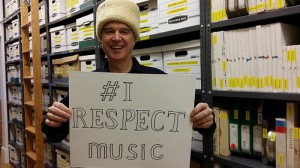Streaming Services And The Future Of Music(ians)
posted in: Music News
 A few weeks ago, artist David Byrne published on his website an essay entitled “How Will the Wolf Survive: Can Musicians Make a Living in the Streaming Era.” In it, he relays his view that, unless changes are adopted in the way musicians earn from streaming music, musicians will wither and their heretofore steady stream of art will dry up. Streaming services, he says, impart legitimacy to the act of consuming music without paying for it.
A few weeks ago, artist David Byrne published on his website an essay entitled “How Will the Wolf Survive: Can Musicians Make a Living in the Streaming Era.” In it, he relays his view that, unless changes are adopted in the way musicians earn from streaming music, musicians will wither and their heretofore steady stream of art will dry up. Streaming services, he says, impart legitimacy to the act of consuming music without paying for it.
This reinforces the idea that music is something you can (and should) get for free, even if now it’s legal. For consumers this is a pretty amazing deal”it’s like Napster, but legal! The government tends to view things that way too”what’s good for the consumer is theoretically encouraged and supported. Sadly, consumers and businesses that cater to their demands don’t often take the long view; they’ve been known to overfish huge swaths of the oceans, spill oil over and over, chop down all the trees in a forest and then wonder why the topsoil that would support reforesting has washed away. So, I wonder similarly if streaming-on-demand might be similarly a business model that will deplete the resource”we who create music”that it depends upon. Many industries have depleted the resources they depend on, it’s not like it hasn’t happened before.
Byrne goes on with a point-by-point discussion of the common responses to this troubling vision, and suggests four things that could drastically improve – or at least illuminate – the challenges he sees. He calls for a better split of the monies paid out from the streaming services, a chance to opt-out, transparency in accounting, and an end to “free” streaming services. It is worth reading in full, and note the ways in which he defines the services he’s critiquing, specifically excluding non on-demand options like Pandora.
Billy Bragg responded to Byrne’s view in a speech given at an event sponsored by Music Tank (which he subsequently adapted for his own Facebook page). Bragg mostly agrees with Byrne’s perspective, making some distinctions that are experiential, and some that are simply uncertainties, but then disagrees with one key element of Byrne’s four suggestions:
Where I part company with Byrne is when he suggests
What if there was no free on-demand streaming (unless the artist is directly controlling that access through their own site or as a publicity endeavor)? In other words, the free ad-supported Spotify version should go away, as would free music on YouTube
I’m afraid there’s no way that YouTube, Spotify and the rest are going to ˜go away’. That particular genie will not go back into the bottle and if we as artists choose to make that our key demand we will look both self-serving and naí¯ve. This doesn’t mean that we should accept the status quo. Clearly, the service offered to the public for free by YouTube undermines both copyright and remuneration agreements and needs to be challenged. In my opinion, YouTube is a much greater threat to creative viability than the emerging streaming services, undermining as it does the idea that you should pay for music.
Both artists agree that this is an important topic that demands discussion and action. Streaming services are very likely the future of music, but artists “provide the fuel,” in Bragg’s words, and need to have an equal voice in how this future is engineered.
More like this:
Do You Respect Music?
The Best Music Books of 2013
Industrial Revolution: Revaluing Music
